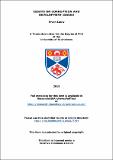Files in this item
Essays on corruption and development issues
Item metadata
| dc.contributor.advisor | Forgues-Puccio, Gonzalo F. | |
| dc.contributor.advisor | Smith, Ian | |
| dc.contributor.author | Lauw, Erven | |
| dc.coverage.spatial | ix, 165 p. | en_US |
| dc.date.accessioned | 2015-11-13T15:54:54Z | |
| dc.date.available | 2015-11-13T15:54:54Z | |
| dc.date.issued | 2015 | |
| dc.identifier | uk.bl.ethos.675200 | |
| dc.identifier.uri | https://hdl.handle.net/10023/7784 | |
| dc.description.abstract | Corruption is widely considered to have adverse effects on economic development through its negative impact on the volume and quality of public investment and the efficiency of government services. Conversely, many of these macro variables are determinants of corruption. However, there are few studies of this two-way interaction at the macro level. This thesis aims to extend the current literature on corruption and development by explicit investigation of two diverse channels through which corruption and economic development interact, namely women's share in politics and pollution. For each variable, the thesis presents a theoretical model in which corruption and economic development are determined endogenously in a dynamic general equilibrium framework. We have four main results. First, female bureaucrats commit fewer corrupt acts than male bureaucrats because they have lower incentives to be corrupt. Second, corruption affects pollution directly by reducing pollution abatement resources and indirectly through its impact on development. As pollution and development appear to have an inverse U-shaped relationship, the total effect of corruption on pollution depends on the economy's level of income. Third, we confirm a simultaneous relationship between corruption and development. Fourth, for sufficiently low income levels, corruption and poverty may be permanent features of the economy. In addition to the two theoretical models, the thesis also presents an empirical investigation of the causal effect of women's share in parliament on corruption using panel data and gender quotas as instruments for women's share in parliament. Our results overturn the consensus since we find no causal effect of women's share in parliament on corruption, except in a particular case of Africa with reserved seats quotas. | en_US |
| dc.language.iso | en | en_US |
| dc.publisher | University of St Andrews | |
| dc.rights | Creative Commons Attribution-NonCommercial-NoDerivatives 4.0 International | |
| dc.rights.uri | http://creativecommons.org/licenses/by-nc-nd/4.0/ | |
| dc.subject | Corruption | en_US |
| dc.subject | Economic development | en_US |
| dc.subject | Gender inequality | en_US |
| dc.subject | Pollution | en_US |
| dc.subject.lcc | JF1525.C66L2 | |
| dc.subject.lcsh | Political corruption | en_US |
| dc.subject.lcsh | Economic development | en_US |
| dc.subject.lcsh | Political participation--Sex differences | en_US |
| dc.subject.lcsh | Pollution--Economic aspects | en_US |
| dc.title | Essays on corruption and development issues | en_US |
| dc.type | Thesis | en_US |
| dc.contributor.sponsor | Scottish Institute for Research in Economics (SIRE) | en_US |
| dc.contributor.sponsor | University of St Andrews | en_US |
| dc.type.qualificationlevel | Doctoral | en_US |
| dc.type.qualificationname | PhD Doctor of Philosophy | en_US |
| dc.publisher.institution | The University of St Andrews | en_US |
This item appears in the following Collection(s)
Except where otherwise noted within the work, this item's licence for re-use is described as Creative Commons Attribution-NonCommercial-NoDerivatives 4.0 International
Items in the St Andrews Research Repository are protected by copyright, with all rights reserved, unless otherwise indicated.


